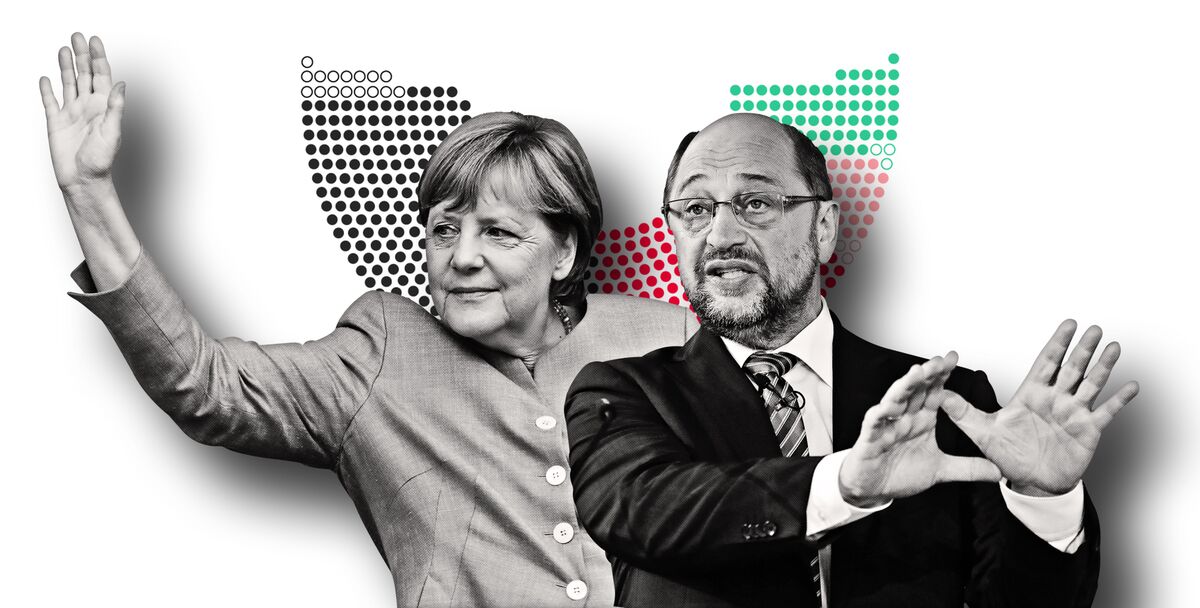
It’s almost half way through the decisive phase of the campaign, and Angela Merkel has made some additions to her schedule that hint at possible concerns close to home.
On Thursday, the chancellor made four stops in Mecklenburg-Western Pomerania in Germany’s northeastern corner, where her Christian Democratic Union was pushed into third place in last year’s regional elections by the anti-immigration Alternative for Germany party. Three of the four stops were in districts where the AfD outpolled the CDU, including the university city of Greifswald, which is in Merkel’s parliamentary district.
Next week, Merkel will make three more campaign stops in the Social Democrat-run state, and this time it’s in areas where the AfD’s lead over the CDU was more marked, including in Barth, also in her district.
State votes are a far cry from federal elections and no-one is predicting the chancellor will lose the electoral district she has represented since 1990 -- she retained it in 2013 by a margin of some 37 percentage points. But a strong showing for the AfD and its rejection of the chancellor’s refugee stance in her home state would be an embarrassment she’ll want to avoid.
Here’s what else we learned this week:
Giving Her All
Merkel managed to give little away over 97 minutes of questioning during her traditional end-of-summer press conference. At one point, she bristled at the suggestion the campaign is boring, saying she found it exhilarating “to meet new people every day.”
The word is that the Chancellery had expected much tougher questions and came away surprised at how easily Merkel got off. “I give it my best,” she told reporters.
Strong Words
Perhaps the one moment that will endure from Tuesday’s briefing is Merkel’s blunt response to remarks made by a leading AfD candidate that the chancellor’s integration minister should be “dumped in Anatolia.” The statement, directed at a Hamburg-born German citizen with Turkish roots -- who is incidentally a Social Democrat -- “is racist,” Merkel said.
The AfD recognizes it’s got an image problem, an issue underlined by such “verbal blunders,” Alice Weidel, the party’s other leading election candidate, said in an interview. What’s more, with a support base that’s overwhelmingly male, the AfD has “nothing to offer” women voters, Weidel said. AfD campaign posters featuring women in bikinis and the traditional Bavarian dirndl may not help to broaden the party’s appeal.
Not With You
This was the week that parties began looking beyond Sept. 24 to the post-election landscape. Horst Seehofer, the Bavarian premier and leader of Merkel’s prickly sister party, the Christian Social Union, poured cold water on the idea of a three-way coalition of the CDU/CSU with the Free Democratic Party and the Greens, one of the possible options suggested by current polls. In an interview with the Abendzeitung newspaper, he railed against Green policy pledges to “raise taxes, ease immigration, ban the combustion engine,” and concluded: “We can’t go along with that.”
Among the grassroots membership of Martin Schulz’s Social Democrats, meanwhile, opposition is widespread to yet another spell as junior partner in a “grand coalition” with Merkel’s bloc. “A majority in the regional branches want the SPD to either field the chancellor or go into opposition,” said Ingrid Arndt-Brauer, an SPD lawmaker. An election result of 30 percent or more would strengthen the party’s hand in coalition negotiations and could make it more palatable to members. Still, SPD support sits at 23 percent in the current Bloomberg poll tracker.
Christian Lindner, who leads the Free Democrats, conducted a veritable storm of interviews last week, including with Bloomberg, and insisted that his party wasn’t going to enter into government at any price. Scorning what he said were plans being laid to procure “pots of money” for the euro area at German taxpayers’ expense, Lindner said policy differences with Merkel’s bloc are wider than in the past, hence a rerun of the grand coalition was more likely than a government involving his party.
As with all political predictions, statements ruling in or out various coalition options are generally subject to change depending on the result delivered by voters. Sunday’s TV debate between Merkel and Schulz will go a long way to determining the outcome on Election Day.
— With assistance by Tony Czuczka, and Eddie Buckle.


0 comments:
Post a Comment